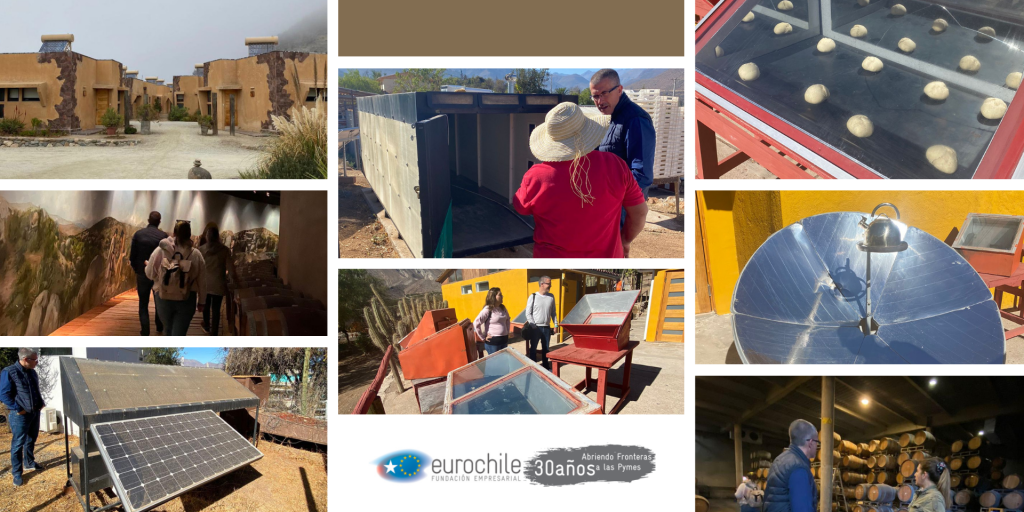Circular Tourist Products in the Coquimbo Region
Circular tourism products are key to sustainable development in the Coquimbo region. By focusing on preserving the environment, boosting the local economy, strengthening cultural identity and reducing waste and emissions, these products benefit both visitors and the local community, laying the foundations for responsible and resilient tourism in the future.

The circular economy model is presented as a tool for integrating sustainability into production processes. The Ellen MacArthur Foundation defines circularity as a framework of systemic solutions that addresses global challenges, such as the elimination of waste and pollution, the circulation of products and materials, and the regeneration of nature to address climate change, biodiversity loss and pollution.
For this reason, the circular model proposes to use resources in a way that maximises their value for as long as possible, while eliminating waste from product design and incorporating measures for the regeneration of nature.
The tourism sector and its value chain are not oblivious to the current global context, and are at odds with the predominant linear model of development. Therefore, the integration of circular economy principles in tourism can contribute to transforming the sector, helping to reduce its negative impacts on the environment and acting as a driver of change to promote more efficient resource management in tourism destinations.
However, for a tourism product to be considered circular, it must fulfil certain characteristics. It is essential that it has a clear vision and strategy oriented towards circularity and sustainability, integrating these principles from the design phase of tourism products or services. In addition, it is important to collaborate with local suppliers and actors to promote responsible consumption.
The use of circular economy tools can help promote the use of renewable and reusable resources in the design and delivery of tourism services. Examples include the use of sustainable transport or renewable energy sources, as well as incorporating reusable packaging during excursions, such as replacing individual plastic bottles with reusable bottles, or replacing plastic tableware with reusable plates and cutlery.
Other key features are related to reducing CO2 emissions along the value chain of tourism services, as well as boosting local development. It is also crucial to develop a communication strategy to inform tourists and suppliers about circularity measures, which is essential to make the sustainability actions of the tourism company known to all its stakeholders. In addition, it is important to provide ongoing support or participation in environmental programmes that contribute to the regeneration of the destination’s natural resources.
To make a real impact, the tourism industry must understand that circularity in products and services is part of a systemic thinking, integrating into a wider, interconnected value chain or production system that includes other sectors such as agri-food, transport and energy.
Actors involved in the creation and development of circular tourism products should concentrate their efforts on areas that can generate the greatest impact in advancing the transition to a circular economy. These priority areas include energy, water, sustainable transport, responsible consumption, waste management and construction.
In this context, during the implementation of the programme “Transfer and Reactivation of Regional Tourism with Circular Economy”, carried out by the Eurochile Business Foundation and financed by the Regional Government of Coquimbo through the Innovation Fund for Competitiveness (FIC), proposals for tourism products based on the circular economy model were identified in each of the provinces of the IV region.
In the province of Elqui, the circular tourist product “Discover the Elqui and its charms” stands out, offering the opportunity to enjoy the charms of the Elqui Valley. The tour begins with a visit to the colonial city of La Serena, followed by a stop in the port city of Coquimbo and the charms of Vicuña, culminating with a night under the stars. This tourist product has the collaboration of the companies Hotel Diego de Almagro and Hotel Terral. A highlight of this component is the incorporation of sustainable practices, such as the use of solar cookers in the Elqui Valley and a visit to the Pisquera Aba attraction.
Likewise, in the province of Limarí, the circular tourism product “Fray Jorge Park Excursion” is identified, which offers a visit to the National Park, which features a Valdivian-type forest in a coastal desert area. This park has been declared a World Biosphere Reserve by UNESCO and is the second Starlight Reserve in South America due to its beautiful and pristine skies. The tour includes a tasting of local gastronomy in the seaside resort of Tongoy. This tourist product stands out for the environmental care practices carried out by CONAF, which include the protection of native flora and fauna.
Finally, the circular tourism product proposal in the province of Choapa, called “Lands of Witches and Condors”, stands out as one of the most unique territories in the region due to its ancestral traditions and natural mountain environment, complemented by the rich gastronomy of the city of Salamanca. Participating companies include Delicias El Tebal, Hotel El Estero and Cervecería Artesanal Brujas-Mallucun Vertical. This tourism product is distinguished by its focus on sustainable practices, such as the use of renewable energy, sustainable organic waste management and the reuse of materials such as plastic and glass.
